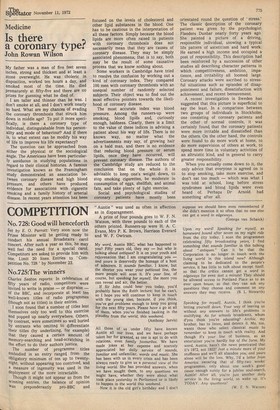Medicine
Is there a coronary type.
John Rowan Wilson
My father was a man of five feet seven inches, strong and thickset and at least a stone overweight. He was choleric in disposition, worked ten hours a day, and smoked most of the time. He died prematurely at fifty-five and there are no prizes for guessing what he died of.
I am taller and thinner than he was. I don't smoke at all, and I don't work nearly so hard. What are my chances of evading the coronary thrombosis that struck him down in middle age? To put it more specifically, is there a coronary type of Individual, distinguishable from his personality and mode of behaviour? And if there IS, to what extent can he modify his way Of life to improve his life expectancy?
The question can be approached from either the physical or the sociological angle. The Americans have been particularly assiduous in studying populations in regard to their clinical histories. A famous investigation known as the Framingham study demonstrated an association between coronary disease and high blood Pressure, and others have produced evidence for associations with cigarette smoking and a family history of arterial disease. In recent years attention has been focused on the levels of cholesterol and other lipid substances in the blood. One has to be cautious in the interpretation of all these factors. Simply because the blood lipids are more often raised in patients with coronary thrombosis does not necessarily mean that they are causes of coronary disease. They may be simply associated phenomena; that is to say, both may be the result of some causative process that we know nothing about.
Some workers in Cambridge have tried to resolve the confusion by working out a kind of coronary index. They compared 100 men with coronary thrombosis with an unequal number of randomly selected subjects. Their object was to find out the most effective pointers towards the likelihood of coronary disease.
The most accurate index was blood pressure. Among the runners-up were smoking, blood lipids and, curiously enough, baldness. Clearly, there is a limit to the value of these indices in advising a patient about his way of life. There is no known way, no matter what the advertisements may say, of growing hair on a bald man, and there is no evidence that reducing blood pressure or serum lipids, once they have occurred, will prevent coronary disease. The authors of the Cambridge study are reduced to the conclusion that on the whole it is advisable to keep one's weight down, to stop smoking cigarettes, be moderate in consumption of eggs, shellfish, and animal fats, and take plenty of light exercise.
Social and psychological studies of coronary patients have mostly been orientated round the question of stress.' The classic description of the coronary patient was given by the psychologist Flanders Dunbar nearly forty years ago She painted a picture of a driving, responsible individual, snowing a typical life pattern of asceticism and hard work. He earned a high income and occupied a post of responsibility. This description had been reinforced by a succession of other studies all describing character patterns in which competitiveness, ambition, impatience, and irritability all loomed large. Coronary attacks were ascribed to stressful situations such as episodes of disappointment and failure, dissatisfaction with achievement, and recent bereavement.
A. recent investigation in Sweden has suggested that this picture is superficial to say the least. In a comparison between two groups of individuals in Stockholm, one consisting of coronary patients and the other of normal controls, it was certainly found that the coronary patients were more irritable and dissatisfied than the others. On the other hand, the controls were found to do more work at home, to do more supervision of others at work, to spend more time in voluntary activities of an altruistic kind, and in general to carry greater responsibility.
When you actually come down to it, the only advice that everyone is agreed on is to stop smoking, take more exercise, and don't eat too much — which was what I was told at school, long before stress syndromes and blood lipids were even heard of. Perhaps Dr Arnold had something after all.


















































 Previous page
Previous page